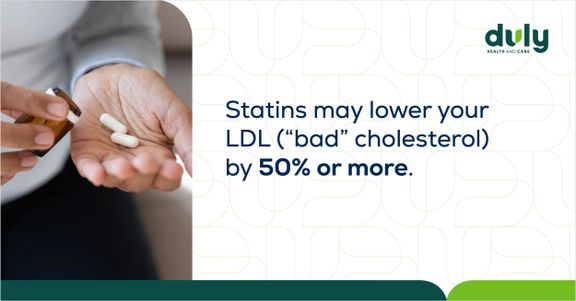You feel perfectly healthy and normal. It doesn’t feel like anything has changed since your last blood test. So, when your routine bloodwork comes back showing high cholesterol, you’re very surprised.
This is a common experience for people with high cholesterol. There are no symptoms, and the only way to detect it is through a blood test.
Before you start panicking or throwing out your carton of eggs, take a moment to understand what high cholesterol really means and how you can manage it to maintain a healthy level.
There are several popular misconceptions floating around about high cholesterol and how to treat it. But here’s the truth behind some of the most common myths.
MYTH: All cholesterol is the same.
FACT: There are actually two types of cholesterol in your blood: low-density lipoprotein (LDL) and high-density lipoprotein (HDL). They’re often referred to as “bad” and “good” cholesterol.
LDL is the “bad” one. This is what makes up most of your blood’s cholesterol. Too much LDL can cause atherosclerosis, where fat builds up in your arteries (blood vessels that carry oxygen-rich blood from your heart to the rest of your body). Over time, atherosclerosis can cause your arteries to narrow, which may prevent blood from getting where it needs to go. This can eventually lead to life-threatening conditions like a heart attack or stroke.
HDL is “good” cholesterol. Unlike LDL, high amounts of HDL can actually decrease your risk for heart attack and stroke. It does this by carrying bad cholesterol to your liver so that it can be broken down and flushed out of your body.
In addition to LDL and HDL, it’s important to pay attention to your triglycerides. These are the most common fats found in the body. When combined with high bad cholesterol or low good cholesterol, it can further increase your risk for heart attack and stroke.
Also read: What Is Cholesterol?
MYTH: As long as your HDL is high, it doesn’t matter if your LDL is high.
FACT: High levels of HDL are very helpful – to a certain extent. HDL only carries a fraction of the cholesterol in your blood and doesn’t completely eliminate LDL. In other words, having high HDL won’t cancel out high LDL.
Also, when it comes to HDL, it may be possible to have too much of a good thing. Levels that are too high can actually cause atherosclerosis to progress faster.
MYTH: People with high cholesterol shouldn’t eat eggs.
FACT: There is a difference between the cholesterol found in your blood and cholesterol found in food (dietary cholesterol). Dietary cholesterol comes from animal-based foods, like eggs, butter, high-fat meat, and full-fat dairy products. There’s also dietary cholesterol in foods made with these ingredients, like baked goods.
Until very recently, it was thought that eggs and other foods with high dietary cholesterol were major contributors to heart disease. However, newer research tells a different story. The real association between the two may be that foods high in dietary cholesterol tend to be high in things that are linked to heart disease (like saturated fat). Certain cholesterol-rich foods, like eggs, likely aren’t increasing your blood cholesterol – it’s the foods like bacon and ham that people often pair with eggs that are problematic.
MYTH: Family history of high LDL is the main culprit of high cholesterol.
FACT: In most cases, high LDL is caused by lifestyle. Some of the most common behaviors that can increase your bad cholesterol are:
- Eating a diet that’s high in saturated and trans fats
- Not getting enough physical activity
- Smoking or being exposed to tobacco smoke
- Being obese or overweight
That being said, your family history can absolutely play a role. Familial hypercholesterolemia (FH) is a condition that makes it hard for your body to remove bad cholesterol from your blood, and it’s passed down from parents to their children. It starts during childhood, which means that cholesterol can start to build up from a very early age.
There are several reasons why your provider may suspect FH, such as unusually high LDL levels, a family history of coronary artery disease or high cholesterol, or symptoms of atherosclerosis (like leg pain when walking or chest pain or pressure) at a young age. They may perform a physical exam to look for skin changes, like yellow to orange bumps, that could be signs of fats building up under the surface of your skin. In some cases, they may recommend genetic testing to find changes in your genes that are known to cause FH.
Also read: Heart Disease Risk Factors: How Much Control Do You Have?
MYTH: Everyone with high cholesterol needs to take medication.
FACT: As with any medical condition, everyone is different. Treatment depends on a combination of factors, such as your overall health, if you have other risk factors for heart disease, or if you have FH.
For many people, the first line of treatment is making lifestyle changes, like adopting a more heart-healthy diet and losing weight.
Read about our Culinary Medicine program, where qualifying patients take lessons from board-certified culinary medicine physicians, licensed dietitians, and seasoned chefs to learn how the right foods can serve as medicine.
In other cases (like if someone has FH), or if these changes don’t do the trick, it might be time for medication.
Statins are the most common and effective medications for high LDL. They change how your body processes cholesterol, lowering the amount of LDL in your blood. In addition, they can decrease triglycerides.

MYTH: Statins are dangerous.
FACT: It’s natural to be hesitant about taking a new medication – especially those like statins that are likely lifelong treatments. But most of the time, statins are safe and don’t cause side effects.
Another big misconception about statins is that they can suddenly trigger diabetes. It’s true that statins can raise your blood sugar slightly, increasing the risk for type 2 diabetes. However, this is often seen in people who already have blood sugar that’s higher than normal. Plus, research has shown that the benefits of statins outweigh this small risk.
MYTH: Young people shouldn’t take statins.
FACT: Starting a statin early may help stop or slow the progression of atherosclerosis and provide lifelong health benefits.
Why do many people think statins aren’t for young adults? It could be because some national guidelines recommend statins for those ages 40 to 75 who are at high risk of developing high cholesterol within the next 10 years. These guidelines focus on the 40+ age group because most clinical trials include fewer participants under 40, and the 10-year risk tends to be lower in younger people.
If you have concerns about statins – or about any aspect of high cholesterol – make sure to reach out to your provider. They can help you find a treatment or prevention plan that’s best for you.
Ready to take control of your cholesterol? Schedule an appointment online with a Duly Health and Care primary care provider.
Health Topics:


